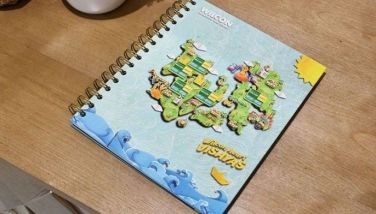The Importance of playtime
CEBU, Philippines - Play is every child’s comfort zone. It is a self-initiated act that gives him the space and time to meet and socialize with peers. That is why everyone – grown-ups included – long for playtime because it is a time filled with fun!
In playing, it promotes a child’s cognitive development if he is allowed to explore things deeply, whether by himself or with other children. His curiosity is fueled. Using his creative imagination, he thinks up ways to transform scrap materials into robots, a cooking pot, or other toys. Playing permits the child to be a fireman or a doctor or whatever he wants to be! At playtime, he gets to use his imagination, usually together with other kids.
Playtime teaches kids about the importance of establishing good relationship with others. It helps them learn the value of collaboration, trust, and empathy by understanding the needs and wants of their playmates.
Children together at play are able to consult decisions, plan things as a team, and decide together on what to do when their plans do not work out. They learn to be more open to others’ opinions and express their own ideas.
The Ramon Aboitiz Foundation Inc.-Dolores Aboitiz Children’s Fund believes that play is a big part of every child’s life as it impacts greatly the child’s development. Through play, a child explores the limits of his imagination.
Some of the many ways that playtime benefits children are:
It teaches communication skills. When the child is with his playmates, his communication skill is developed. He can be both a good listener and a good speaker when he is playing. He learns to negotiate, express his thoughts, and accept the opinions of his peers. In getting together with other kids he learns how get along with others.
Play can teach kids on how to manage “negative” emotions. They build a free environment where one another’s opinions and feelings are valued. For example, when playing games like hide and seek, they learn to obey the agreed rules that everybody are supposed to observe.
It improves social and creative skills. Playtime gives a child the opportunity to mingle with other kids. He develops his skills on negotiation, cooperation, and sharing. Even if play sometimes ends in a fight, the experience itself teaches the child how to decide and take actions. Kids also love to imitate actions from others, like trying to maneuver a bike after watching a playmate do it successfully.
At play a child finds new learning experiences that might not be possible elsewhere. Play materials such as toys, clays, boards, and scrap paper are learning tools that let the child create different things with his rich imagination.
The spontaneity of play activities encourage a child to “think outside the box.” They enable him to be “in charge” of what he is doing. He may investigate, test his theories, dig cause-and-effect situations, all at his own pace.
It develops physical strength. Playing involves physical activities that test the strength and endurance of the child. Playing lets the child stretch the limits of his growing body. For instance, his baby muscles are developed whenever he climbs, swings, and runs!
A play date makes play more fun. Heading over to another kid’s house on a play date gives a child ample time to know more about the interests of his playmate. Not only would it be a comfortable venue for play (and free toys too), there would also be adults to oversee the kids’ activities.
How do you a schedule play date? First try to pick a time when the kids are in a good mood to play, in order to avoid them fighting. The best time is often in the morning, after eating their afternoon snacks, or after their nap. For the first play date, limit the number of playmates to two kids. This would give them an easier time to socialize, and of course there’s less chance for a fight to break out.
If the first try is successful, you can do it again at another venue – a library, park, or even at the zoo. It’s better to know ahead of time the field of interest of the other kid in order to avoid “parallel play,” meaning that kids sit near each other yet play with different set of toys.
Just a note: Don’t complicate your plan for a play date. Keep it simple. Just give the kids a little space at your home or wherever, a set of coloring materials and empty milk cans, and just let them enjoy it. Or plan activities that you think they like and enjoy the most. But, remember to let them have the final say on what they really want to do,
The kids’ play dates should not be too long. If it drags on for hours, they will get tired and bored. A 90-minute playtime is enough for a first occasion. An adult must be around during the whole time to monitor for any signs of disagreements, such as name-calling or hitting.
(Reference: www.ph.she.yahoo.com) (FREEMAN)
- Latest


























